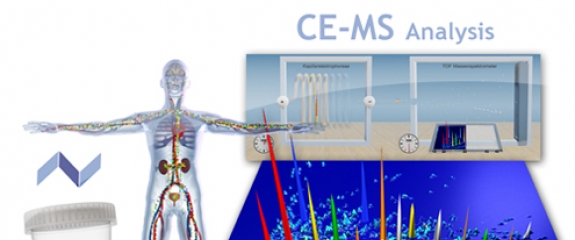Letter of Support issued by FDA for CKD273

Mosaiques-diagnostics GmbH, a diagnostics company based in Hannover, Germany, provides highly innovative clinical proteomics services for academic institutions and pharmaceutical companies. Employing capillary electrophoresis technology coupled to mass spectrometry, the company is involved in efforts to diagnose severe diseases at an early development stage, control efficacy of applied therapies in personalized medicine, examine efficacy of new drugs in preclinical (animal models) and clinical trials and to identify therapeutic targets.
The concept behind the services offered by Mosaiques-diagnostics is based on specific conditions expressing different patterns of protein expression. Proteins are indispensable for the function of cells and organs, as well as for all communication inside the body. They also catalyse chemical reactions and protect the body against pathogens. Thousands of proteins and peptides are involved in these processes, forming a distinct pattern, which changes with disease. Mosaiques identifies up to 6,000 of such proteins and polypeptides and subsequently generates disease specific patterns. The company is using this vast wealth of information to facilitate diagnosis of disease and enable implementation of effective therapies. Urine is the specimen of choice since it can be obtained in large quantities and collection is non-invasive. Urine contains thousands of proteins and polypeptides that hold specific information on the (patho)physiology.
The science behind the techniques used by Mosaiques-diagnostics has been demonstrated robustly within the scientific literature with publications in over 160 high ranking journals, including, but not limited to: Nature Medicine, Blood, JASN, Lancet Oncology, and Mass Spectrometry Reviews.
In June, Mosaiques-diagnostics GmbH received a ‘Biomarker Letter of Support’ from the US Food and Drug Administration’s (FDA) Centre for Drug Evaluation and Research. In the letter, the FDA encourage further development of CKD273, a prognostic enrichment biomarker panel composed of 273 urinary peptides, to be used in combination with more traditional measures for the identification of patients with early stage diabetic kidney disease. This represents a major achievement for Mosaiques-diagnostics and for the field of clinical proteomics in general. To put this into perspective, to date the FDA has only issued 10 such letters and this is the first one for a proteomics-based test.
Chronic kidney disease is a major health problem, especially in type 2 diabetes. Many patients with diabetic kidney disease manifest progressive renal dysfunction, ultimately leading to end stage disease. Diagnosis is currently based on the presence of microalbuminuria and changes in serum creatinine. However, it is possible that by the time current methods detect signs of development the patients kidneys are already thought to have undergone pathological changes.
Negotiations are already ongoing with health insurance companies concerning how this tool can be used with their customers and other agencies with companies wanting to conduct further clinical trials.


